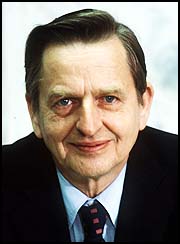 |
|
Olof Palme was born in Sweden on January 30, 1927. He served in the Swedish army in World War II and began his higher education in Sweden, earning a law degree in Stockholm. Palme then received a BA in Political Science from Kenyon College in Ohio in 1948.
Palme spent three months following his graduation on a tour of the United States, embarking with just $300 in his pocket. He later said that what he saw and heard on that trip influenced his political and social ideals. |
Palme joined the Social Democratic party in 1952, and soon after was hand-picked as personal secretary to Swedish Prime Minister Tage Erlander, beginning a long career in his country's government. He was elected to the Riksdag, Sweden's parliament in 1958. He became minister of communication in 1965 and minister of education in 1967. Olaf Palme won his first term as prime minister in 1968 and served until 1976; he was reelected prime minister in 1982, and again in September 1985.
In June 1970, Palme returned to Kenyon College to receive an honorary doctor of humane letters degree and delivered an address, "On the Freedom of Men and the Freedom of Nations". It was his only major speech during that trip to the United States, which came at a time when he was a controversial figure in the country for his opposition to the war in Vietnam. Palme's speech emphasized the importance of freedom – academic, personal, political – and social responsibility. "Democratic freedom requires solidarity among the people," he stressed. "In order to live and survive a society must have a comprehensive solidarity, the ability to recognize the conditions of other people, a feeling of joint responsibility and participation. Otherwise, sooner or later, society will fall apart into petty, egotistical interests. There is never 'we' and 'they.' There is only us."
Besides opposing the war in Vietnam, Palme was also critical of the nuclear arms race – serving as chairman of the Palme Commission, which put forward numerous proposals on disarmament. The Palme Commission issued the 1982 report, Common Security, which argued that both East and West have legitimate security needs. It can never be possible, the Commission said, to demand unilateral security for one block based on superior military resources. On the contrary, in a world of incomprehensibly destructive nuclear potential, every ideological offensive toward military supremacy is a threat to universal security.
Between 1980 and 1982, he mediated 5 times on behalf of the UN, seeking a peaceful settlement in the war between Iran and Iraq. Palme was also tireless in his efforts to promote international action against apartheid – especially in the aftermath of the Soweto massacre of 1976, and at the height of South African civil unrest beginning in 1984. He was instrumental in obtaining a firm commitment from Socialist International in support of the African liberation struggle, and he constantly challenged the major Western Powers that obstructed international action. He was always abreast of developments in southern Africa and paid great attention to the views of the leaders of liberation movements, with whom he frequently met. As an ardent opponent of apartheid, he applauded the Palestine Liberation Army and Castro's Cuba.
Tragically, on February 28, 1986, in Stockholm, Olaf Palme was assassinated at the age of 59. |

